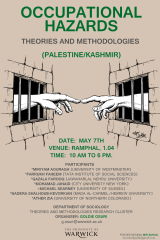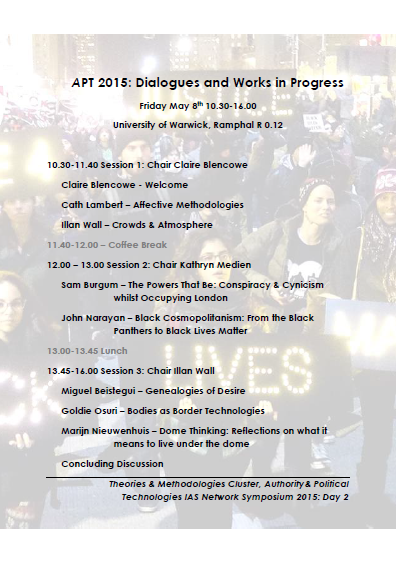Theories and Methodologies Cluster/APT Symposium 2015: Occupational Hazards / Dialogues
Theories and Methodologies Cluster, Sociology, and APT present a two day symposium at the University of Warwick - May 7th-8th
Occupational Hazards: Theories and Methodologies (Palestine/Kashmir) - a workshop: May 7th, 10.00-18.00 Ramphal R1.04
RSVP: Goldie Osuri (G.Osuri@warwick.ac.uk)
Authority and Political Technologies - Dialogues and Works in Progress: May 8th. 10.00-16.00 Ramphal R2.41
The symposium is free to attend but registration is essential and places are limited. If you would like to present a work in progress on day 2 please register and submit an abstract as early as possible and by Friday 24th April at the latest. Registration here.
Day One: Occupational Hazards: Theories and Methodologies (Palestine/Kashmir)
Organiser: Goldie Osuri
In recent years, questions regarding appropriate theories and methodologies have been an ongoing preoccupation in the discipline of Sociology. A number of recent turns (e.g. cultural, affective, materialist) have raised the problematic of theory as well as method. For example, Urry and Laws (2004) have advocated an ‘ontological politics’; i.e., if methods produce the social, how do or should sociologists interfere in its making? Savage and Burrawoy (2007) have called for rethinking social research methods in the context of technological transformations outside the academy. Adkins and Lury (2009) raise the question of the constitution of the empirical and how it matters in our era.
In zones of conflict or occupation, questions regarding politics and ethics rather theory than method have been foregrounded. The question is not simply one of binaries between politics and ethics on the one hand and theory and methods on the other, but to highlight the ways in which the specificities of working in zones of conflict and/or occupation may be productive for the debates around theories and methodologies. Bringing together scholars working on Palestine and Kashmir, this workshop will explore the many dimensions and challenges regarding theory and method which characterize ‘doing research’ in zones of conflict and/or occupation.
Speakers include: Nadera Shalhoub -Kevorkian; Mohamad Junaid; Michael Kearney; Miriyam Aouragh; Ather Zia; Gazala Farooq and Farrukh Faheem. Chair: Goldie Osuri.
Day Two: Authority and Political Technologies - Dialogues and Works in Progress
Organisers: Authority and Political Technologies IAS Research Network.
Friday May 8th 10.30-16.00
University of Warwick, Ramphal R 0.12
10.30-11.40 Session 1: Chair Claire Blencowe
Claire Blencowe - Welcome
Cath Lambert – Affective Methodologies
Illan Wall – Crowds & Atmosphere
11.40-12.00 – Coffee Break
12.00 – 13.00 Session 2: Chair Kathryn Medien
Sam Burgum – The Powers That Be: Conspiracy & Cynicism whilst Occupying London
John Narayan – Black Cosmopolitanism: From the Black Panthers to Black Lives Matter
13.00-13.45 Lunch
13.45-16.00 Session 3: Chair Illan Wall
Miguel Beistegui – Genealogies of Desire
Goldie Osuri – Bodies as Border Technologies
Marijn Nieuwenhuis – Dome Thinking: Reflections on what it means to live under the dome
Concluding Discussion


